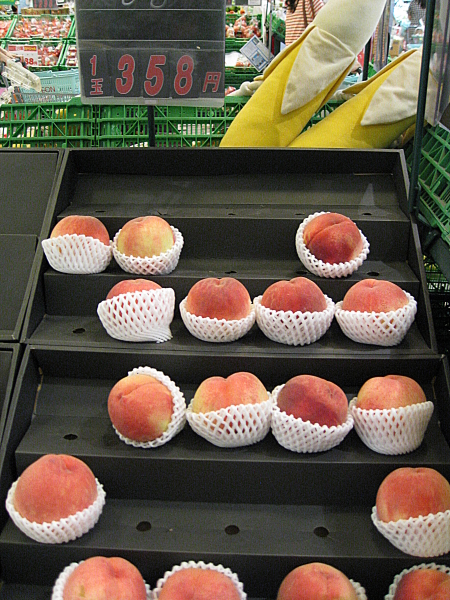speckulations

The recent (partially rather violent) food crisis has shed some light on the conflicts to be expected if resources are getting even scarcer.
In view of this it is clear that people try to sort out the major reasons for this rather sudden increase in food prices.
So in particular it seems that since this research working paper by an author of the Development Prospects Group at World Bank the meme that biofuels are the major reason for the food crisis keeps on circulating.
Biofuels are certainly one reason for the crisis (and this was somewhat forseeable) but e.g. the “Economic Assessment of Biofuel Support Policies” by the Directorate for Trade and Agriculture, OECD (2008-07-16) makes also clear that other factors must have played a major role.
From the assessment:
Despite the rapid and substantial increase in crude oil prices and hence in the costs for gasoline and fossil diesel, the cost disadvantage of biofuels has widened in the past two years as agricultural commodity prices soared and thereby feedstock costs increased.
The medium-term impacts of current biofuel policies on agricultural commodity prices are important, but their role should not be overestimated. The price effects attributable to biofuel policies derive largely from increased demand for cereals and vegetable oils. With biofuel support policies in place in 2007, 12% of global coarse grain production and 14% of global vegetable oil production could be used for biofuels in the medium-term, up from 8% and 9% in 2007, respectively. But future policy developments matter: with full implementation of the recently enacted US Energy Independence and Security Act and the currently proposed new EU Directive for Renewable Energy, close to 20% of global vegetable oil production and more than 13% of world coarse grain output could shift to biofuels production.
Current biofuel support measures are estimated to increase average wheat, maize and vegetable oil prices by about 5%, 7% and 19%, respectively, in the medium term. Prices for sugar and particularly for oilseed meals are actually reduced by these policies – a result of slightly lower production of sugar cane- based ethanol in Brazil and significantly higher biodiesel-related oilseed crush. The new US and proposed EU initiatives could further increase commodity prices by a similar magnitude.
…
Linked to the price effects noted above, existing and any additional support for biofuels might have important implications for global land use and are likely to accelerate the expansion of land under crops particularly in Latin America and large parts of Africa. While this might provide additional income opportunities to generally poor rural populations, care would need to be taken to avoid possible environmental damages, including accelerated deforestation, additional release of greenhouse gases, loss of biodiversity and runoff of nutrients and pesticides.
Based on the analysis in the assessment, a number of policy recommendations are offered, which are interesting to read (summary p.9). Among others it is recommended to modify current support policies in order to balance food insecurity for the most vulnerable population groups in developing countries. Moreover the recommendations display that the relationship between biofuel and food production is rather complex and that a lot of factors have to be taken into account. In short – there is NO easy answer like: biofuels are bad because they take away food from people. In particular: using such an oversimplified view in order to replace biofuels by nuclear power is just negligence.
Other major obvious reasons for the food crisis are higher food consumption (mainly due to a rising world population (but see also this randform post and the links in there)) and the high price for oil.
Tariffs and subsidies are further reasons but a rather explosive fact is that higher food prices are also most likely related to financial speculations (see also this report in Spiegel).
What happened here?
-As it seems speculators were/are buying large quantities of certain financial instruments notably socalled future contracts or simply futures and this had driven up food prices. Futures are a kind of future price guarantee/security, i.e. a contract to deliver a commodity (rice, grain etc.) on a future date at a prearranged price. Means: futures usually may help e.g. a farmer to have some security on the prospected income/costs.
However when speculators were buying large quantities of futures of a certain kind (like for rice) the usual function of a future, namely to secure for the risk of price changes (hedge out) had been rather taken away. I.e. by making futures into a scarce product and thus unappropriately expensive (if I understood correctly the price for a future is determined with respect to its supply/demand if the commodity itself is scarce or doesnt yet exist like before a harvest) this not only distorted the hedging mechanism but it is somewhat clear that higher prices for futures drives up the prices of the commodities themselves (in particular the pricing mechanism of the commodities seem to rely at least partially on the pricing of futures). In other words: speculators make profits on the back of the most hungry. By the way this also puts employees at the corresponding financial companies under quite a bit of stress due to the involved moral conflict.
The above financial mechanisms sound maybe complicated, unfortunately things could get even more complicated if one takes e.g. options and their complicated pricing into account.
In a way the involved dynamics can be understood a bit by the below example of peaches at a local supermarket. Assuming that canning the fruits and shipping them is about as expensive as shipping fresh fruits (I think over here the climate is good enough for peach trees) the price difference between fresh and canned fruit should mainly be due on one hand to the quality* of the fruit and on the the other hand the price difference should be due to the risk of and sudden sometimes unexpected price changes, which could be caused by market dynamics, season or rotting/pests during transport etc.
So the price for one (fresh) peach is 358 yen (more or less during season!) which is about 2.36 Euro or 3.34 US-Dollar. The canned peaches costs 98 yen.
(*”Quality of a fruit” is a discussable issue. Frankly speaking the peaches on the picture look to me rather sick (a bit too cheek and rosy) – especially the plastic wrap around them. I imagine they have a rather watery taste and they actually look a bit like being out of plalstic! But apparently this is how fresh fruits are expected to look like over here)

October 8th, 2009 at 9:32 pm
twthis is hilarious! You must see gal that you cant always blame the west for people living in poverty!
I mean its a fact – there are people who just dont work hard enough and thus their earnings are poor! you always get back something for what you invest in!
October 10th, 2009 at 11:33 am
Victor,
Given your recent comments, it seems you took a keen interest in this blog and what I wrote. This is fine with me. I am just worried about some of your phrases. I can’t imagine that your remark “you always get back something for what you invest in!” was meant with its full meaning. It is clear that people dont always get back what they invest in, -not even something. For a rich person this may be unpleasant, but for some people, like the above mentioned hungry people, this may have existential dimensions and thus your remark sounds to me rather cynical and quite out of place in this context. Everybody has the right to eat, even without work.
Apart from the above mentioned food injustices another example where you dont get necessarily “back what you invest in” are pitfalls and exploitations on the workplace.
Here a link to an older article about karoshi and guolaosi (death from overwork) from a (union-friendly) magazine which investigates work-related hazards. Or here a more recent article related to rising workplace exposures. I hope you never need to invest your life.